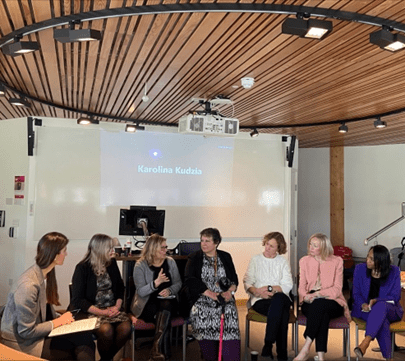Making Mentoring Work for Women

In this blog post I will be sharing some of the wide-ranging discussion and learning points from the recent EBS International Women’s Day event involving a panel discussion of Making Mentoring Work for Women. Essex Business School is currently reviewing its approach to staff mentoring so the topic felt timely. With the discussion being chaired by Dr Anna Sarkisyan, Co-chair of the new EBS Women’s Working Group, the panellists included:
- Teresa Alvarez, Student Services Advisor and Co-chair of Women’s Working Group, Essex Business School
- Bridget Connell, Executive Coach, Business Mentor, Board Advisor, Essex Business School Alumni
- Claudia Girardone, Dean of Essex Business School and Professor of Banking and Finance
- Sam Honey, Executive Vice-President and Managing Director of Compliance Division, Ideagen, Essex Business School Alumni
- Claire Penketh, Communications and Policy, BCS, The Chartered Institute for IT, Essex Alumni
- Leila Thomas, Urban Synergy CEO and Founder, Essex Business School Advisory Board Member

Early on in discussion a consensus emerged around the potentially transformational role of mentoring. Our panellists recalled how it had generated fruitful opportunities to draw on the career experiences and learning of others, helping to build self-confidence and a sense of direction. At the same time, mentoring could be experienced as a powerful tool for eroding feelings of loneliness and isolation that are common when someone is feeling unsupported. Mentoring can provide a sense of having someone in your corner who has faith in you. This can be valuable for older and younger people alike. Several panellists were in private sector senior leadership roles and spoke of continuing to find themselves in new situations, for example upon changing job roles, where they re-accessed mentoring support. Mentoring was argued to be beneficial for students too. Teresa Alvarez reflected on how Student Support Advisers sometimes identify a student who seems in need of a mentor, blossoming as a result. Mentoring can arguably support the retention of students (and staff).
Mentoring is something that both parties to the relationship can potentially gain from. For a start, doing good can feel good! Mentors can find that the interactions and conversations with their mentee prompts them to reflect on their own career. Recent years have also seen greater discussion of the value of reverse mentoring. For example, an older person gaining insights into how well a university department works from a younger person’s perspective. There is considerable potential for these kind of benefits at Essex Business School.
Again, our main IWD event topic was on Making Mentoring Work for Women. In this regard role model effects can be an important feature of mentoring relationships. Women can be effectively mentored by men and several panellists shared positive experiences of this. Amongst these was Claudia Girardone, the Dean of Essex Business School, who reflected on being mentored by men in finance early on in her career at a time when there were few if any female role models. Nevertheless, women’s experience of being mentored by women can be quite distinctive with women looking to female mentors to say “I did it and you can do it too”. Leila Thomas, the CEO of Urban Synergy, a charity specialising in the mentoring of young people, relayed how soon after she first became a mother she had hesitated to throw her hat into the ring and apply for a more demanding job opportunity. To have a mentor say that she had been in Leila’s position and managed to overcome the barriers that caring responsibilities can pose for career development, and how, really helped to change her mind-set about what might be possible. In other words, Leila’s interaction with a mentor supported an informed choice, leading her to apply for the job and go on to both get it and thrive in her new role. Drawing on her experiences Leila often tells young people to Be Bold Be Brilliant Be Brave and has found mentoring to be an empowering tool that can help overcome disadvantage.
Sam Honey raised the issue of imposter syndrome and there seemed to be a perception across panellists that women are more susceptible to self-doubt about capabilities and the validity of aspirations. Interestingly there was a consensus amongst the panellists on their experiences in organisations where they observed that it was typical men being promoted, with those men being undeterred by only partially meeting the selection criteria. Mentoring interventions were argued to have the potential to provide support in channelling a more positive inner voice for women, a point pertinent to make on International Women’s Day which calls for global action on gender parity.
A distinction can be made between formal mentoring within a structured mentoring programme and informal mentoring in which two people form a relationship in which they benefit from friendship and support. Claire Penketh described how this could happen by chance, as she experienced when meeting one of her future mentors for the first time on a train journey. All the panellists agreed that networks were important for women’s career development with some panellists feeling that men made more time for informal mentoring. Bridget Connell referred to how a tap on the shoulder from someone encouraging you to take a career step can make a real difference to your trajectory. Relatedly, you may need a mentor who can open a door and say ‘you can go in now’, or help you see that you might need to leave an organisation in order to accelerate your career. While informal approaches to mentoring can work, formalising mentoring can really help to convey a sense that an organisation genuinely cares for its people.
Arising from the discussion were some generic tips for making mentoring work, including:
- Finding the right mentor. You need someone with the knowledge and experience to engage with your goals. In fact, it can be helpful to have more than one mentor, as different people may have varying contributions to make to supporting a mentee with a variety of goals. Remember that mentors don’t necessarily need to be more senior than you. There is much to be said for peer mentoring, recognising the range of experience that can feed into mentoring support. Mentoring does not need to be a hierarchical relationship. Other characteristics may help someone be a good mentor, for example the willingness to open up and share experiences with the mentee. And in some instances being mentored by a women is important as there are some issues and concerns that it may be difficult for men to understand.
Remember that mentors can have detrimental biases and it is probably better to avoid a mentor who will be biased against you! A well-chosen mentor can help to bring you into the room, acting as your sponsor through advocating for you. When looking for a mentor try to find someone who can encourage you out of your comfort zone and support your development and growth.
- Agree goals that are SMART (Specific, Measurable, Achievable, Relevant, and Time-Bound). The timebound nature of mentoring is important. Meetings with mentors are likely to be more constructive if they are goal specific. Once agreed goals have been achieved, the mentee can think about their next goal and who might be best placed to support them in striving for it. Mentoring at the right moment is important.
- Define up front the time you will spend with each other. Agree how often you will meet, when and how. Mentoring can take place in person and virtually. There has even been experimentation with ‘speed mentoring’ following the principles of speed dating!
- Don’t wait to be assigned a mentor. Don’t be afraid to approach senior colleagues for mentoring support. Sometimes they may say no (for a variety of reasons) and direct you to someone else. If someone does say no to mentoring you, do approach someone else! Find someone who you admire and trust. Some panellists felt that as you get older and more experienced you can better understand who might make a better mentor for you at different points in your learning and working life. This can feel harder to do the more junior you are and having an organisational list of mentors that you can engage with can provide you with somewhere to start. An action point for all attending the IWD event was for anyone without a mentor to find one! IWD event participants were urged to be the CEOs of their careers, drawing on mentors and their support to help empower them by, in effect, showing them the way. Part of the message here is to “have a vision” and be ambitious and that the mentor is there for a short time to help in achieving that vision (in the spirit of “just do it”).
- Understanding that mentors need to be trained. Organisations need to put arrangements in place to support the training and development of mentors.
- Make mentoring visible. Talk about it. Be creative and think broadly about what mentoring might look like for your organisation.
Both individuals and organisations (and the contexts in which they operate) are complicit in the prospects for mentoring success. Remember that mentoring is a life skill that we can potentially all deploy and benefit from at different points in our lives.
Several IWD event participants indicated that they were unaware of how to access mentoring support. EBS is currently reflecting on how to strengthen its mentoring support for both staff and students and there will hopefully be an update on this very soon. For now, further information about mentoring opportunities at the University of Essex can be found at the following links.
For staff
For students
Transitions and transformations sponsorship programme
Further reading
CIPD (2009) Mentoring – CIPD Fact Sheet
Dashper K. (2019) Challenging the gendered rhetoric of success? The limitations of women-only mentoring for tackling gender inequality in the workplace. Gender Work & Organisation, 26: 541–557.
Leenders, J, Bleijenbergh, I, Van den Brink, M. (2020) Myriad potential for mentoring: Understanding the process of transformational change through a gender equality intervention. Gender Work & Organisation, 27: 379– 394.
Acknowledgements
Thank you to Claudia Girardone and Anna Sarkisyan for their comments on an earlier draft of this blog.
